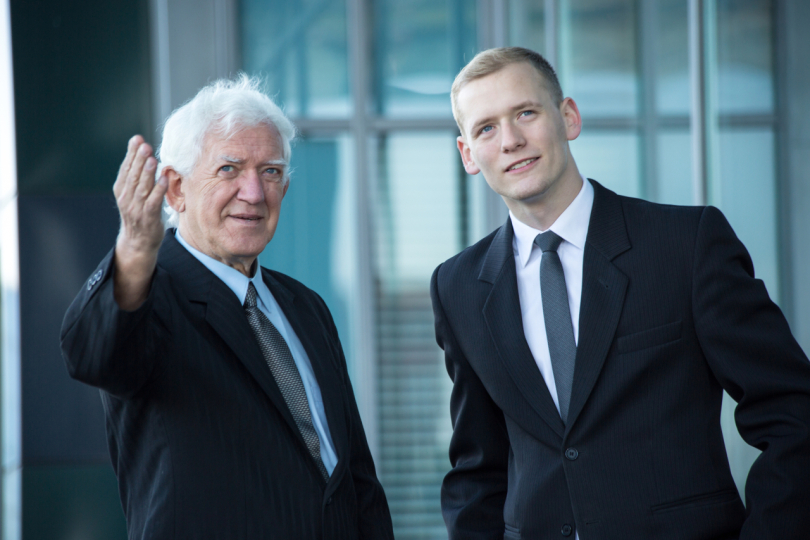
Why Economic Forecasters Fail
The human factor, a reluctance to scare investors and the absence of tangible rewards for predicting recessions are some of the reasons why professional forecasters sometimes fail to signal economic downturns. In their study, Sergey Smirnov and Daria Avdeeva found evidence indicating that professional forecasters tend to hold on to optimistic scenarios for too long.
-%D0%BC%D0%B0%D0%BC%D0%B0%20%D1%81%20%D1%80%D0%B5%D0%B1%D0%B5%D0%BD%D0%BA%D0%BE%D0%BC%20%D0%B7%D0%B0%20%D1%81%D1%82%D0%BE%D0%BB%D0%BE%D0%BC.jpg)
How Children Affect Mother's Career
Mothers of three or more children are four times as likely to be unemployed compared to mothers of one or two children, according to Alina Pishnyak's study 'Employment opportunities and constraints for women in Moscow.'
Ensuring Clean Water Is the Only ‘Water Issue’ That Can Be Currently Solved
According to participants in the recent BRICS Water Forum, out of all of the global challenges in regards to water resource management through the use of technological breakthroughs, only keeping water clean can be guaranteed at the moment.
Studying Medicine in the Humanities
At the most recent Andrey Poletayev Memorial Readings held by the Poletayev Institute for Theoretical and Historical Studies in the Humanities (IGITI), participants discussed the relationship between the natural sciences and the social sciences. HSE Professor Elena Vishlenkova tells us why scholars in the humanities are interested in the natural sciences and what contribution they can make to this field.

Pets Can Help Families Deal with Relationship Problems
The decision to get a family pet tends to be associated with children’s growing-up crises. According to the researchers, many parents adopt a cat or a dog at a time when their son or daughter is going through a major change, such as starting school or entering puberty. At such times, the child's attitudes towards themselves and the outside world can change drastically, causing anxiety in the family. Research suggests that pets can help both parents and children cope with stress. The study's findings are published in the paper 'The likelihood of getting a family pet depending on the age of children.'
Recent HSE Conference Offers Seminar on Education and Development
On September 16, the Centre for Cultural Sociology and Anthropology of Education (HSE Institute of Education) held a seminar entitled ‘Trajectories and Educational Choice’ that brought together experts to discuss a number of topics related to educational expansion and the relationship between schooling and economic development.

Fathers and Sons Don’t Compete on Labour Market
Younger and older employees are not competitors on the labour market. The possible increase in the retirement age and, accordingly, increased employment among the elderly won’t add to youth unemployment and won’t limit the opportunities for young people’s employment. These are the findings made by Sergey Roshchin and Victor Lyashok in their study ‘Younger and older employees on the Russian labour market: substitutes or not?’
Interest in Intellectual Capital and Intangibles Is Present in All Countries
The 12th Annual International Workshop ‘Intangibles, Intellectual Capital and Extra-Financial Information’ was held at HSE St Petersburg last week. This is an established event that many academics and practitioners in the area of intellectual capital and intangibles know about due to its high credibility. Most of the relevant people in this field have participated in the workshop throughout the years.
Berlin Scholar to Return to HSE for Series of Lectures on Literature
From September 25 till October 5 2016, Professor Dr Joachim Küpper of the Free University of Berlin will deliver a series of lectures on ‘Humanities and Conceptualization of Time at HSE Moscow. Joachim Küpper’s travel to HSE follows the university’s decision this past summer to join a key project run by the Dahlem Humanities Center at the Free University of Berlin called ‘The Thematic Network Principles of Cultural Dynamics’.
Upcoming Lectures on Ocean Science Politics to Give HSE Exposure to Modern Anthropology
Stefan Helmreich, Professor and Elting E. Morison Chair in the Department of Anthropology at the Massachusetts Institute of Technology, will be at HSE Moscow and HSE St Petersburg from September 25 – October 4, 2016 to deliver a series of lectures and lead a discussion on the politics of contemporary ocean science. He will also take part in the round table 'Soundscape in the Anthropology of Science and Art' during the Days of Ethnographic Cinema festival organized by the HSE School of Cultural Studies.

